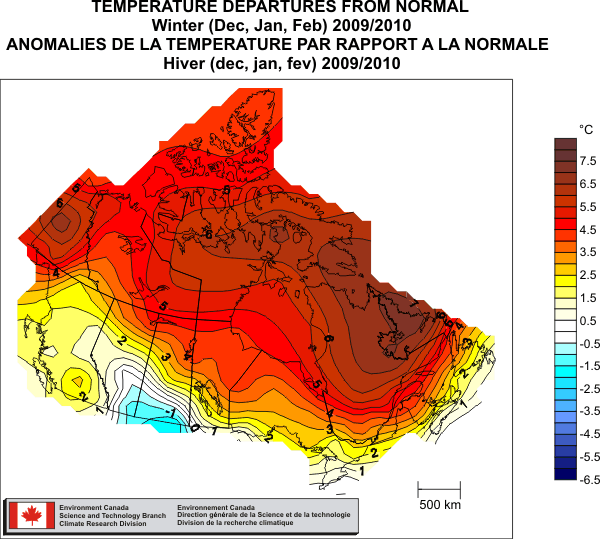Canada winter warmest and driest on record: ‘It's like winter was cancelled in this country’
By Margaret Munro, Canwest News Service
March 9, 2010 From the balmy Arctic, to the open water of the St. Lawrence and snowless western fields, this winter has been the warmest and driest in Canadian record books. Environment Canada scientists report that winter 2009/10 was 4C above normal, making it the warmest since nationwide records were first kept in 1948. It was also the driest winter on the 63-year record, with precipitation 22 per cent below normal nationally, and down 60 per cent in parts of Alberta, Saskatchewan and Ontario. “It’s beyond shocking,” David Phillips, a senior climatologist with Environment Canada, told Canwest News Tuesday. Records have been shattered from “coast to coast to coast.” “It is truly a remarkable situation,” says Phillips, noting that he’s seen nothing like it in his 40 years of weather watching. He also warns that “the winter than wasn’t” may have set the stage for potentially “horrific” water shortages, insect infestations and wildfires this summer. As much of Asia, Europe and the U.S. shivered through and shovelled out of freak winter storms, Phillips says Canada was left on the sidelines. “It’s like winter was cancelled in this country,” he says. Temperature across Canada, except for a small area over the southern Prairies, were above normal, with some parts of Nunavut and northern Quebec more than six degrees above normal, he and his colleagues report. It’s been “downright balmy” in much of the north, the St. Lawrence River is all but ice free, as are waters off Newfoundland, while Vancouver had to haul in snow for the Winter Olympics. Phillips says the extraordinary winter appears to be tied to several factors, chief among them El Nino, a shift in the winds and ocean currents in the Pacific Ocean, and the shrinking Arctic ice, which has thinned and retreated markedly in recent years. “I think it’s a combination of a strong El Nino and the shrinking and disappearance of the ice at the top of the world,” says Phillips, adding that changing “pressure spots” in the Arctic and Atlantic also played a role. “They’ve all been working in cahoots to create this unbelievable winter.” …
Wacky winter a signal of years to come: Climatologist via The Oil Drum
